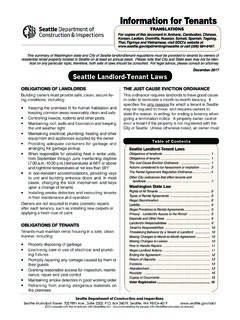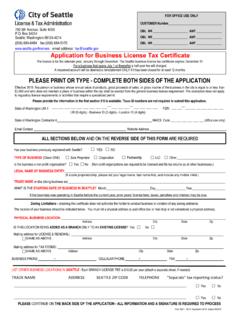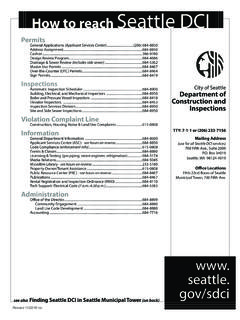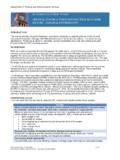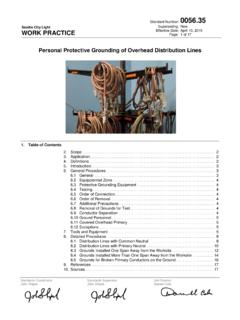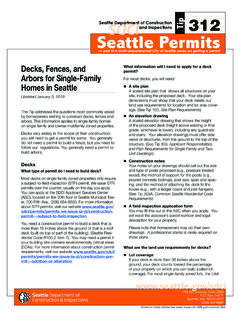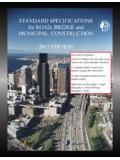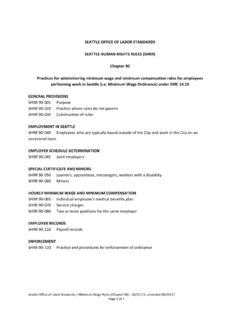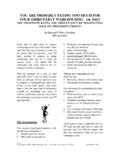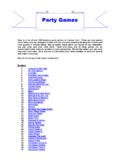Transcription of Seattle Municipal Code Chapter 7.25 Effective February 1, …
1 Seattle Municipal code Chapter Effective February 1, 2004 Text of the Third party Billing Ordinance #121320 Dispute Resolution and Remedies. (SMC ) (.PDF 84kb) Questions and Answers What is third party billing for utility service? Third party billing exists when a residential building in the City of Seattle receives utility services and the landlord passes on the cost of one or all of these services to each rental unit on the property. A landlord, or billing company acting as its agent, that wants to bill tenants for water, sewer, garbage or electrical services, must do so in accordance with this new law. Who is covered by the new law? This new law only applies to City of Seattle residents. The law covers tenants in residential buildings with three (3) or more units, as well as tenants in mobile home parks or boat moorages. This law applies whether the tenant has a written lease, a month-to-month arrangement or no lease. How does third party billing work? First, the landlord receives a billing statement of utility charges for the master meter on the property, which is used to measure services used by the entire property, or for other unmetered services provided to the property, such as garbage or sewer.
2 The landlord then divides the bill for each tenant's share of the utility charges. Finally, tenants receive a bill from the property landlord or a billing company, not from the City of Seattle . The bill sent to tenants may not be entirely based on each tenant's usage. Is third party billing legal? Yes. The City of Seattle and Washington State laws allow landlords to bill tenants for utilities. The City of Seattle has recently adopted rules designed to provide safeguards for tenants, which go into effect on February 1, 2004. The rules require the property landlord or billing agent to provide tenants with specific information about their bills and to disclose their billing practices either in a rental agreement or a separate written notice. I just received a utility bill from some unknown company, and my landlord never told me anything about it. What can be done? If a landlord imposes new billing practices on or after February 1, 2004, without telling tenants about it, then the landlord has violated the new law.
3 Tenants should first try to resolve any billing dispute or issue with their landlord. However, tenants can file a complaint with the Seattle Office of the Hearing Examiner or take the landlord to court, and the landlord could be required to pay a penalty. What should a tenant's bill include? The name, business address and telephone number of the landlord or third party billing agent, whichever one sent the bill to the tenant. Show the basis for each separate charge, including service charges and late fees, if any, as a line item, and show the total amount of the bill. If the units are submetered, include the current and previous meter readings, the current read date, and the amount consumed. Specify the due date, the date upon which the bill becomes overdue, the amount of any late charges or penalties that may apply, and the date upon which such late charges or penalties may be imposed. Any past due dollar amounts. The name, mailing address and telephone number for billing inquiries and disputes, the business hours and days of availability, and the process used to resolve disputes related to bills.
4 How are tenant utility bills calculated? Landlords have several methods for allocating utility bills. Landlords may also decide to install submeters and begin billing on a submetered basis. Tenants should check their lease or the written notice provided by the landlord to determine what method was used and how their bill was calculated. How do tenants know if their utility bill is based on a water submeter? The landlord or the billing agent must provide tenants with written notification that informs them whether submetering is used, the location of the submeters, and access requirements for reading, repair, maintenance, inspection or testing. Is it okay to receive an estimated bill? Yes, if a landlord received an estimated bill from the utility. If a landlord gets a corrected bill from the utility, he/she must refund any overcharges to the tenant who overpaid. The landlord can also ask tenants to pay any undercharges, but not if the undercharges occurred when someone else lived in the unit.
5 What utility charges can be passed through to tenants? The total charges sent to all the tenants in a building must not exceed the amount of the bill sent by the utility for the entire building, minus any late fees or other charges that the landlord owes to the utility. In addition, the following charges are permitted: A service charge of no more than $2 per utility per month, not to exceed a cumulative service charge of $5 per month for all the utilities. Late payment charges of no more than $5 per month plus interest at a rate not to exceed 1% per month. Late payment charges shall not accrue until at least 30 days after the tenant receives the bill. Insufficient funds check charges for dishonored checks must not exceed $31 per dishonored check What information and records must be made available to tenants? Landlords must post, or hand-deliver or mail to tenants if posting isn't possible, a written description of the methodology used to allocate each utility service and a copy of Seattle Municipal code Chapter In addition, landlords must post copies of the three most current utility bills in the building and must keep utility bills for the last two years.
6 Landlords must make the last two years' utility bills, and the three most current utility bills if they cannot be posted, available to tenants upon request, within five (5) business days. What can tenants do if they think their water submeter is inaccurate? The Consumer Affairs Unit of the Department of Executive Administration will submit a proposal on a meter testing program and fees to the City Council by June 2004. Until then, there will be no process for the city to test the accuracy of water submeters. The testing program may include "on site" and "lab" testing options. Either the tenant or landlord will be charged a test fee to recover city costs depending on whether the meter passes or fails the test. How do tenants dispute third party bills? The tenant must notify the billing agent and explain the reason for the dispute within 30 days of receiving the bill. The billing agent must contact the tenant to discuss the dispute within 30 days of receiving notice of a billing dispute.
7 Tenants must have a good faith basis for disputing the bill, and must pay any amounts they are not disputing. Tenants must first work with the billing agent to resolve the dispute, but may file a complaint with the Seattle Office of the Hearing Examiner, or go to court if necessary. If a tenant doesn't file a complaint or go to court within 120 days of notifying the billing agent of the dispute, the landlord may take the tenant to court or take other actions to resolve the dispute. Can a landlord or third party billing agent affect a tenant's credit report? Maybe. A landlord may have a right under state or federal law to contact a credit reporting agency. Third party billing agents may not tell a credit reporting agency about a claim against a tenant except as provided in state law Chapter of the Revised code of Washington, even if the third party billing agent is not licensed under the law. Can a landlord or third party billing agent give out personal information about a tenant?
8 A landlord can only give a tenant's name and address to a third party billing agent and cannot give the agent social security numbers or other personal information. If a landlord gave a billing agent personal information about a tenant before this law went into effect, the billing agent can't use, sell, or disclose that information. Billing agents must destroy any personal information about a tenant if asked to do so, if the tenant moves, or if the landlord stops using the agent for billing. There may be certain times that the billing agent must disclose personal information, such as in response to a subpoena or valid court order. Is the Washington State Legislature considering any third party billing legislation? The State considered third party billing legislation in both 2003 and 2004. The legislation considered during the 2004 session borrowed some language from the City of Seattle 's current ordinance, but this legislation lacked significant protections for tenants. The State's 2004 third party billing legislation would have repealed the City's law and deprived Seattle tenants of the strong consumer protections in the City's ordinance.
9 Although the State 2004 legislation died in committee, watch for more third party billing legislation in future legislative sessions.
